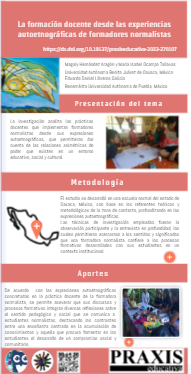Treinamento de professores a partir das expressões autoetnográficas dos professores educadores
DOI:
https://doi.org/10.19137/praxiseducativa-2023-270107Palavras-chave:
treinamento inicial, treinadores, zona de contato, expressões autoetnográficas, contexto socialResumo
Os processos de formação de professores são uma estrutura que expressa uma gama de sentidos e significados que mostram os imaginários e as auto-representações que tanto os instrutores quanto os alunos geram a partir das relações que estabelecem consigo mesmos, com os outros e com o contexto no qual interagem. Por esta razão, este artigo teve como objetivo analisar as práticas de ensino implementadas pelos formadores de professores, a partir de uma abordagem analítica de suas expressões auto-etnográficas que nos permitiria dar conta das relações de poder assimétricas que existem em um ambiente educativo, social e cultural. A pesquisa foi realizada em uma escola de formação de professores no estado de Oaxaca, México, sob uma perspectiva interpretativa, baseada nas referências teóricas e metodológicas da zona de contato. Os resultados mostram o alcance feito pelos treinadores de acordo com as construções pessoais e sociais que eles imprimem em seus discursos e práticas pedagógicas.
Downloads
Referências
Arnaut, A. (1996). Historia de una profesión: los maestros de educación primaria en México, 1887-1994. Centro de Investigación y Docencia Económicas.
Bernstein, B. (1997). La estructura del discurso pedagógico. Morata.
Contreras Domingo, J. (2010). Ser y saber en la formación didáctica del profesorado: una visión personal. Revista Interuniversitaria de Formación del profesorado, 24(2), 61-81. http://www.redalyc.org/articulo.oa?id=27419198004
Dewilde, J. y Skrefsrud, T. A. (2016). Including alternative stories in the mainstream. How transcultural young people in Norway perform creative cultural resistance in and outside of school. International Journal of Inclusive Education, 20(10), 1032-1042. https://www.tandfonline.com/doi/full/10.1080/13603116.2016.1145263
Fierro, C. y Fortoul, B. (2017). Entretejer espacios para aprender y convivir en el aula. SM de Ediciones México.
Gómez-Sollano, M. y Adams, T. (2019). Hegemonía y alternativas pedagógicas. Los nudos ciegos de la teoría. Educação (Unisinos), 23(1), 124-140. https://doi.org/10.4013/edu.2019.231.08
Neuman, W. L. (2014). Social Research Methods: Qualitative and Quantitative Approaches: Pearson New International Edition. Pearson Education Limited.
Pratt, M. L. (1991). Arts of the contact zone. Profession, 33-40. https://www.jstor.org/stable/25595469
Santos De Sousa, B. (2010). Descolonizar el saber, reinventar el poder. Ed. Trilce. http://www.boaventuradesousasantos.pt/media/Descolonizar%20el%20saber_final%20-%20Cópia.pdf
Sautu, R. (2003). Todo es teoría. Lumiere Ediciones.
Thompson, J. B. (2002). Ideología y cultura moderna. Teoría crítica social en la era de la comunicación de masas. Universidad Autónoma Metropolitana.
Vaillant, D. y Marcelo, C. (2001). Las tareas del formador. http://www.denisevaillant.com/ewp-

Publicado
Edição
Seção
Licença
Aviso de direitos autorais
Comitê Editorial Revista Práxis Educativa:
Declaro que sou o autor do artigo intitulado (nome do artigo), que o mesmo é original e de minha autoria e que não foi publicado anteriormente em qualquer outro formato ou meio. Declaro saber que a revista não me cobrará nenhum tipo de taxa em hipótese alguma, nem receberei qualquer tipo de remuneração monetária.
Caso seja aceito para publicação na Práxis Educacional, autorizo a referida revista a publicá-lo digitalmente e a divulgá-lo em suas redes sociais.
Se o trabalho for publicado, aderi à licença Creative Commons denominada "Atribuição - Compartilhamento Não Comercial pela mesma Licença CC BY-NC-SA", por meio da qual é permitido copiar, reproduzir, distribuir, comunicar publicamente o trabalho e gerar trabalhos derivados , desde que o autor original seja citado e reconhecido. Esta licença está em uso desde setembro de 2018. Em 2016 foi aderido ao CC BY NC ND 4.0; e nos anos de 2017 e 2018 (janeiro-agosto) CC BY NC 4.0.
Esta licença CC BY-NC-SA Share Alike não permite, entretanto, o uso comercial da obra. Como autor, a revista poderá estabelecer acordos adicionais para a distribuição não exclusiva da versão do trabalho publicado na revista, permite-me autoarquivar os artigos publicados, na sua versão post-print, em repositórios institucionais, temáticos , páginas web pessoais ou qualquer outro uso relevante. com o reconhecimento de ter sido publicado pela primeira vez nesta revista.
SA Práxis Educacional adere à DORA (Declaração sobre Avaliação de Pesquisa) assinada em São Francisco, Califórnia, em 16 de dezembro de 2012, e à Declaração do México (Declaração Conjunta LATINDEX - REDALYC - CLACSO - IBICT).














_(1)2.png)


3.png)











_(2).png)






2.jpg)









